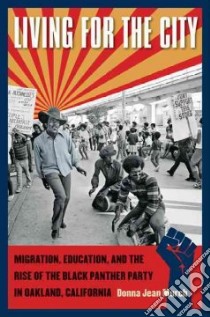Living for the City - 9780807871133
Un libro in lingua di Murch Donna Jean edito da Univ of North Carolina Pr, 2010
- € 31.90
- Il prezzo è variabile in funzione del cambio della valuta d’origine
"This is a brilliant study of the Black Power movement and a major contribution to American social, cultural, and intellectual history, particularly the study of the African American experience. Donna Murch has impressive insights into the political culture of the Black Panther Party, and this book will have a dramatic impact on the way the history of Black Power politics is written." Kemozi Woadard, Sarah Lawrence College
"Donna Murch has crafted a remarkable study of the Emmett Till generation, the young African American men and women whose coming of age was radicalized by a decade of violence---from Till's murder to the assassination of Malcolm X---but leavened by an optimism born of faith in migration, education, and self-invention. From debutante balls in the 1950s to Panther breakfast programs in the 1970s, it was southerners, Murch artfully shows, who transformed Oakland, California, in the civil rights and black power eras." Robert Self, Brown University
In this nuanced and groundbreaking history, Donna Murch argues that the Black Panther Party (BPP) started with a study group. Drawing on oral history and untapped archival sources, she explains how Oakland, a relatively small city with a recent history of African American settlement, produced such compelling and influential forms of Black Power politics.
During an era of expansion and political struggle in California's system of public higher education, black southern migrants formed the BPP. In the early 1960s, attending Merritt College and other public universities radicalized Huey Newton, Bobby Seale, and many of the young people who joined the Panthers' rank and file. In the face of social crisis and police violence, the most disfranchised sectors of the East Bay's African American Community---young, poor, and migrant---challenged the legitimacy of state authorities and of an older generation of black leadership. In excavating this hidden history, Living for the City broadens the scholarship of the Black Power movement by documenting the contributions of black students and youth who created new forms of organization, grassroots mobilization, and political literacy.
Informazioni bibliografiche
- Titolo del Libro in lingua: Living for the City
- Sottotitolo: Migration, Education, and the Rise of the Black Panther Party in Oakland, California
- Lingua: English
- Autore: Murch Donna Jean
- Editore: Univ of North Carolina Pr
- Collana: Univ of North Carolina Pr (Paperback)
- Data di Pubblicazione: 04 Ottobre '10
- Genere: SOCIAL SCIENCE
- Pagine: 311
- ISBN-10: 0807871133
- EAN-13: 9780807871133


